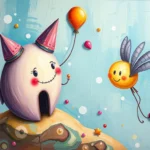
Introduction
Dreams have fascinated humanity for centuries, serving as windows into our subconscious minds. They are often filled with vivid imagery, complex narratives, and strong emotions, which can leave us pondering their meanings upon waking. The intrigue surrounding dreams stems from their potential to reveal hidden fears, desires, and insights about our waking lives. By interpreting our dreams, we can gain valuable understanding of our thoughts and emotions, making dreams a significant topic for exploration.
In this article, we will delve into the symbolism and meanings behind common dream symbols, explore various scenarios that might alter their interpretations, and provide insights on how these dreams can connect to our real-life experiences. By the end, you’ll have a deeper understanding of your dreams and how they can guide you in your day-to-day life.
Symbolism and Meaning
Dreams often contain symbols that carry specific meanings. Understanding these symbols can help uncover the underlying messages our subconscious is trying to convey. Below are some common dream symbols and their interpretations:
| Symbol | Meaning |
|---|---|
| Water | Represents emotions, the unconscious, and change. |
| Flying | Symbolizes freedom, escape, or a desire for new perspectives. |
| Falling | Often reflects feelings of insecurity, loss of control, or fear. |
| Teeth | Can indicate concerns about appearance, aging, or communication. |
| Chase | Represents avoidance of a problem or fear that needs addressing. |
| Nakedness | Symbolizes vulnerability or exposure, often linked to anxiety. |
Perspectives on Symbols
The meanings of these symbols can vary based on personal experiences and cultural backgrounds. For instance, while water can signify emotional depth, in some cultures, it may represent purification or spiritual renewal. Similarly, flying can indicate a sense of liberation for one individual, while for another, it might evoke feelings of anxiety or fear of losing control.
Reflect on your own experiences with these symbols. What personal meaning do they hold for you? This introspection can enhance your understanding of your dreams and their relevance to your waking life.
Key Scenarios and Variations
The context in which symbols appear within a dream can significantly alter their interpretation. Here are some common dream scenarios and how they might change the meaning of the symbols involved:
- Dream of Water:
- Calm lake: This could signify inner peace and emotional stability.
-
Turbulent ocean: This may represent overwhelming emotions or life changes.
-
Dream of Flying:
- Soaring freely: Suggests a feeling of empowerment or overcoming challenges.
-
Struggling to stay airborne: Indicates anxiety about maintaining control in your life.
-
Dream of Falling:
- Falling without fear: Could imply acceptance of change or letting go of control.
-
Falling into darkness: May signify feelings of helplessness or fear of the unknown.
-
Dream of Teeth:
- Losing a tooth: Often relates to fears about aging or loss of power.
-
Healthy teeth: May represent confidence in communication or self-image.
-
Dream of Being Chased:
- Chased by a known figure: Indicates unresolved issues or fear stemming from a specific person.
-
Chased by an unknown entity: Reflects a more generalized fear or anxiety regarding life.
-
Dream of Nakedness:
- In a familiar setting: May signify a fear of exposure among people you know.
- In an unfamiliar place: Could indicate feelings of vulnerability in a new situation.
Understanding these variations allows for a more nuanced interpretation of your dreams. Consider how the specific details of your dream may alter its overall message. Reflecting on these nuances can help you understand the complexities of your subconscious mind.
Real-Life Connections and Takeaways
Dreams are more than just random images; they can provide profound insights into our real-life experiences. Here are some ways to connect your dreams with your everyday life, along with practical advice for self-reflection:
-
Keep a Dream Journal: Writing down your dreams as soon as you wake up can help you remember details and patterns over time. Review your journal regularly to identify recurring symbols and themes.
-
Identify Emotions: Pay attention to the emotions you feel during your dreams. Are you anxious, happy, or fearful? These feelings can provide clues about your waking life and current challenges.
-
Connect with Life Events: Consider any recent events, stresses, or changes in your life that may relate to your dreams. For example, if you have a dream about being chased, reflect on any current pressures or anxieties you may be avoiding.
-
Meditate on Symbols: Take time to meditate on the symbols that appear in your dreams. What do they mean to you personally? How do they resonate with your current life situation? This practice can help deepen your understanding.
-
Discuss with Others: Sharing your dreams with friends or family can offer new perspectives. Others may see meanings in your dreams that you hadn’t considered, enriching your understanding.
-
Set Intentions: Before going to sleep, set an intention or ask a question related to an area of your life you wish to explore. This can guide your subconscious and help you gain insights through your dreams.
By proactively engaging with your dreams, you can uncover valuable insights that may assist you in overcoming obstacles or enhancing your personal growth. Reflect on how your dreams resonate with your daily life and consider how you can implement changes based on these revelations.
Conclusion
Dreams serve as a powerful tool for self-reflection and understanding. By exploring the symbolism, scenarios, and variations within our dreams, we can glean insights that illuminate our waking lives. Whether it’s confronting fears, embracing change, or understanding our emotions, dreams provide a unique lens through which to view our inner selves.
Take the time to reflect on your dreams and the symbols they contain. Engage in self-reflection, and allow your subconscious to guide you toward greater self-awareness and personal growth. Remember, the next time you find yourself lost in a dream, it may just be the key to unlocking a deeper understanding of your life.







